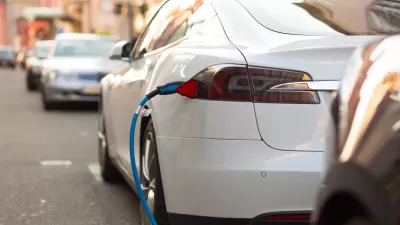The Nissan Leaf, the world's best selling electric vehicle (EV), has a major depreciation problem: leasing contracts are so favorable that when the lease expires, dealers return many of them to the manufacturer because of low demand.
Christina Rogers, an automotive reporter with The Wall Street Journal’s Detroit bureau, begins her piece at a Nissan dealer near Atlanta where the Nissan Leaf has been a "big seller over the past three years thanks to its low monthly lease price."
Adding to the incentive to lease, "the State of Georgia offers an income tax credit for 20% of the cost to purchase or lease a new Zero Emission Vehicle capped at $5,000 per vehicle," according to the Georgia Department of Natural Resources [PDF]. "All-electric vehicles qualify as zero emission vehicles." [The federal $7,500 electric vehicle (EV) credit almost always applies exclusively to new car sales.]
"There is really no incentive to buy a used one when you can lease a new one for less," states the owner of the dealership.
Another contributor to rapid depreciation are low gas prices that reduces demand for EVs. Lowering demand for used EVs is concern that "the expensive batteries could have to be replaced," writes Rogers. The Leaf and the Chevrolet Volt are hardly the only EVs seeing low demand for used vehicles.
Other electric cars, including plug-in versions of Ford Motor Co.’s Focus and Toyota Motor Corp.’s Prius, are depreciating as fast as the Leaf with the average trade-in value in 2014 falling between 22% and 35%, depending on model, according to the National Automobile Dealers Association (NADA)’s Used Car Guide.
The exception, as one might expect, is Tesla's "Model S, a luxury electric sedan whose lower sales volume helps it retain its value better," writes Rogers. "NADA calculates a 2013 Model S this year is worth 71% of its original price, compared with 44% for a Leaf and 39% for a Volt."
See the WSJ graph showing the faster depreciation rates for the Chevy Volt and Nissan Leaf compared with the Chevy Cruz and Nissan Versa.
Of course, for those in the market for used EVs, there are many deals to be had, and Rogers describes the boon for those consumers.
FULL STORY: Resale Prices Tumble on Electric Cars

Maui's Vacation Rental Debate Turns Ugly
Verbal attacks, misinformation campaigns and fistfights plague a high-stakes debate to convert thousands of vacation rentals into long-term housing.

Planetizen Federal Action Tracker
A weekly monitor of how Trump’s orders and actions are impacting planners and planning in America.

San Francisco Suspends Traffic Calming Amidst Record Deaths
Citing “a challenging fiscal landscape,” the city will cease the program on the heels of 42 traffic deaths, including 24 pedestrians.

Adaptive Reuse Will Create Housing in a Suburban Texas Strip Mall
A developer is reimagining a strip mall property as a mixed-use complex with housing and retail.

Study: Anti-Homelessness Laws Don’t Work
Research shows that punitive measures that criminalized unhoused people don’t help reduce homelessness.

In U.S., Urban Gondolas Face Uphill Battle
Cities in Latin America and Europe have embraced aerial transitways — AKA gondolas — as sustainable, convenient urban transport, especially in tricky geographies. American cities have yet to catch up.
Urban Design for Planners 1: Software Tools
This six-course series explores essential urban design concepts using open source software and equips planners with the tools they need to participate fully in the urban design process.
Planning for Universal Design
Learn the tools for implementing Universal Design in planning regulations.
Heyer Gruel & Associates PA
JM Goldson LLC
Custer County Colorado
City of Camden Redevelopment Agency
City of Astoria
Transportation Research & Education Center (TREC) at Portland State University
Jefferson Parish Government
Camden Redevelopment Agency
City of Claremont



























